A football league meant to rival the NFL shattered the glass ceiling. There’s a reason you may have never heard of it
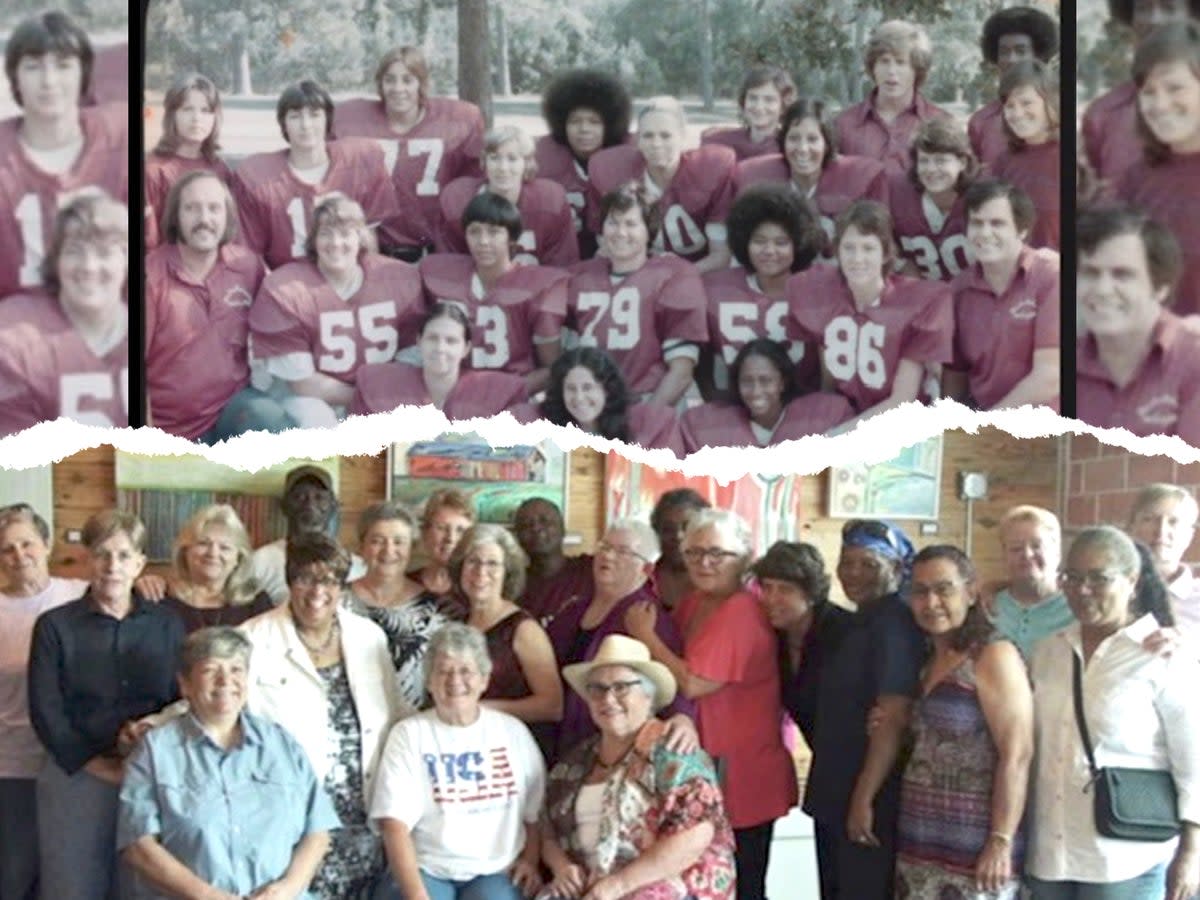
There was a group of athletes like no other that could be found at regular nighttime practices in Houston’s public parks in the late 1970s, their diversity notable in a city still struggling with social strife and segregation. They were Black, white and Hispanic, some childless, some parents; some educated, some not; some rich, some poor; some gay, some straight; and everything in between.
They were also all women — and they were playing professional full-tackle football, a phenomenon virtually unheard of in the gridiron-mad city.
The Houston Herricanes, founded in 1976, was a collection of football fanatics and fiercely determined Texans competing in the National Women’s Football League, established two years earlier in an attempt to create something of a female NFL counterpart. The team, like the league, was sadly short-lived and dismantled by 1980; the players returned to their normal lives and lost touch, their memories vivid but the league’s existence — and historical significance — fading from public consciousness.
Then one of their daughters, a dogged athlete like her mother, grew up to became a filmmaker. Nearly a quarter-century after the Herricanes stormed football fields across the South, their exploits are now being shared on the silver screen.
The Herricanes made its worldwide premiere this weekend at the South by Southwest (SXSW) film festival in the team’s native Texas; director Olivia Kuan was in attendance with her mother, Basia Haszlakiewicz, who’d raised the filmmaker with tales of the team and a similar relish of challenges.
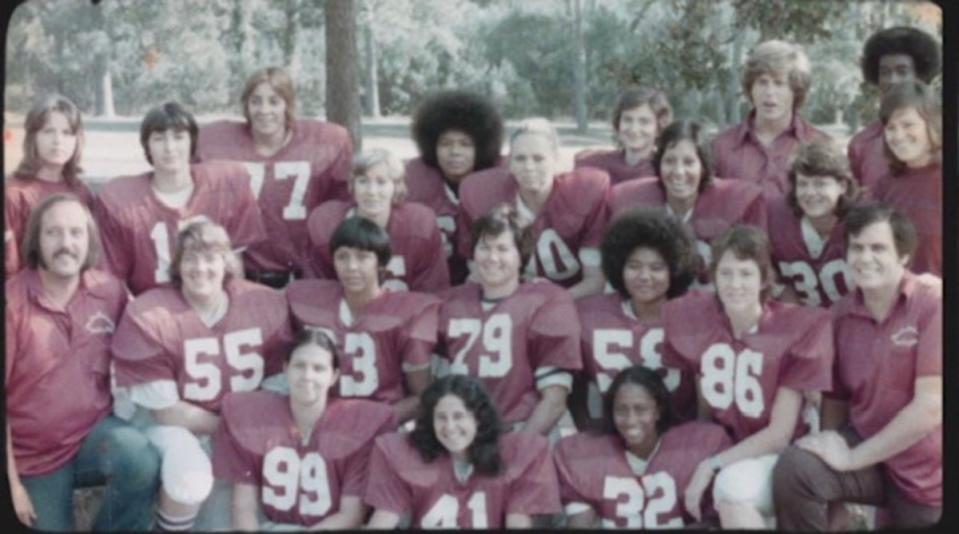
“I never saw her play, but I saw photos — and I heard stories about her teammates, about just the whole experience,” Ms Kuan tells The Independent. “And I think one of the things that struck me early on was all the different colourful characters that were involved — that they were people who were unlike anyone that I knew, based on her descriptions, and that was mostly what drew me in from the very beginning.”
One thing was certain: Every single member of the team and league had been strong, both physically and when it came to character. They not only loved football so much that they played at a time when the decision drew eyebrow raises and scorn; but they also loved a challenge. And each of them was more than up for it.
“I’m one of those people, those women, that never believed in the glass ceiling — I just crashed right through it in football and my career in architecture,” Ms Haszlakiewicz tells The Independent. “I didn’t believe in obstacles; probably, if there was an obstacle, that made me even more determined.
“And maybe that was part of it, playing football ... it’s so unusual. It’s not a feminine sport, and I grew up being told what the feminine sports were. I come from a very athletic background ... I was an athlete all my life. But I was pushed to play tennis or be a gymnast — and what I really wanted to do was play football.”
She’d been a fan of the sport since high school, she reckons, and played flag football in college before moving to Houston and fortuitously hearing about a women’s league on TV.
“I was watching the news, and there was an interview being conducted at the field where the women were practicing,” she says. “And I just couldn’t believe it, because I rarely, rarely watch the news, and there it was. So I said: ‘Well, I guess it’s meant to be.’ And I went to practice, talked to them, and they were thrilled to have someone who even played football before.”
The team had been founded by Martha Bryant, who became a running back wearing Number 30 for the Herricanes. She’d heard about the league, which had been started by talent agent Sid Friedman in 1974, two years after Title IX was enacted and as women’s sports were gaining (very limited) momentum.
He’d envisioned the effort as something akin to “the Harlem Globetrotters but football,” Frankie de la Cretaz, author of Hail Mary: The Rise and Fall of the National Women’s Football League, says in the film. “He thought that maybe the women would play in skirts. But what happened was, the women showed up and they were like, ‘Well, you placed an ad for football — we want to play football.’”
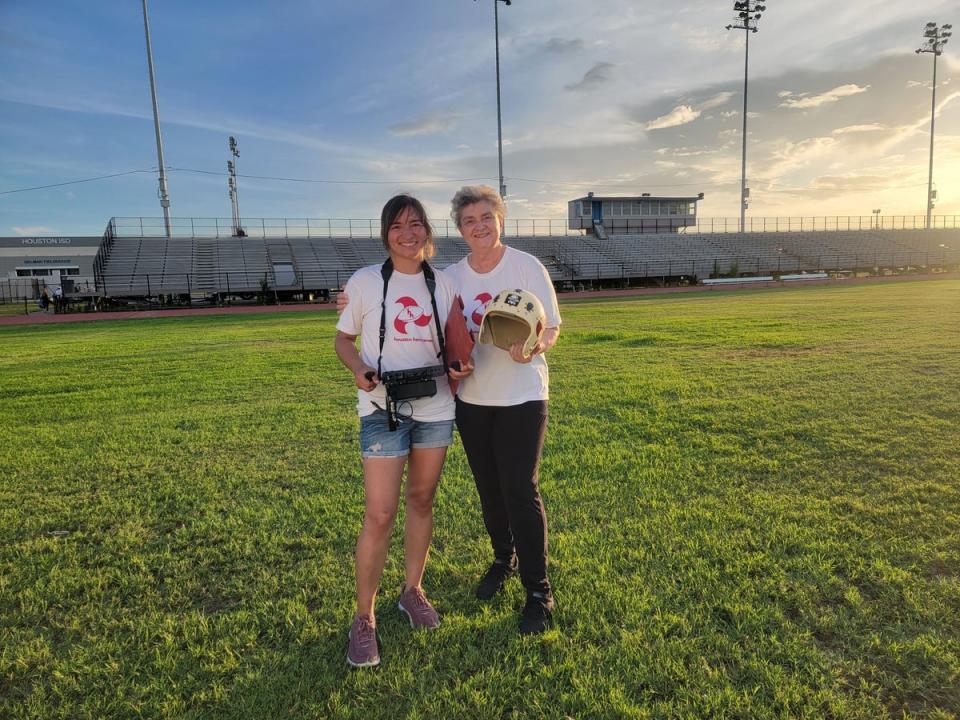
She adds: “A lot of this has not really been documented really well, so you’ll get differing accounts of when the different teams started. But by 1976, there were 14 teams and three divisions.”
Ms Bryant read about three teams down south in a magazine while at the dentist in 1976, she says in The Herricanes, so she wrote a letter to the league asking whether Houston could have a team. They wrote back and said yes.
She contacted the Houston Chronicle, which ran a piece about the effort, and sportscaster Anita Martini — credited in the film and by the players as a huge champion of women’s football and the Herricanes — publicised the call for players.
“We picked a day to have tryouts; women showed up,” Ms Bryant says in the film.
They came from all over the city — from upscale neighbourhoods to the historically Black Fourth Ward — and all walks of life.
“Somebody was a banker, and somebody was in law, and somebody was a bouncer,” Ms Haszlakiewicz says in her daughter’s film. “And there was an exotic dancer on there, too.”
As the athletes trained and learned the intricacies not only of their positions but also, in some cases, the game, they recruited male staff. After one man coached for the first season, a pastor named Robert Massey volunteered to be head coach, and Jeffrey Garner, an in-law of some players, also offered his help. The team cost approximately $10,000 a year to run — huge money in the late 1970s — and not only did the players not get paid, but they also worked full-time jobs in addition to running households.
They were getting better and better — even holding their own against the formidable Oklahoma City Dolls, labelled the team’s “nemesis” in the film by one player — though the inexorably linked financial and spectator numbers remained problematic.
As beloved as the league was by its participants, women’s tackle football was not gaining the traction they’d hoped — and public attitudes waffled from ambivalent to, worse, downright hostile.
“There wasn’t much of a following because nobody had heard of women’s football, so it was hard to get it out there and get the word out there and get people in,” Ms Bryant says in the film, adding: “We had so few people ... and a lot of those were hecklers.”
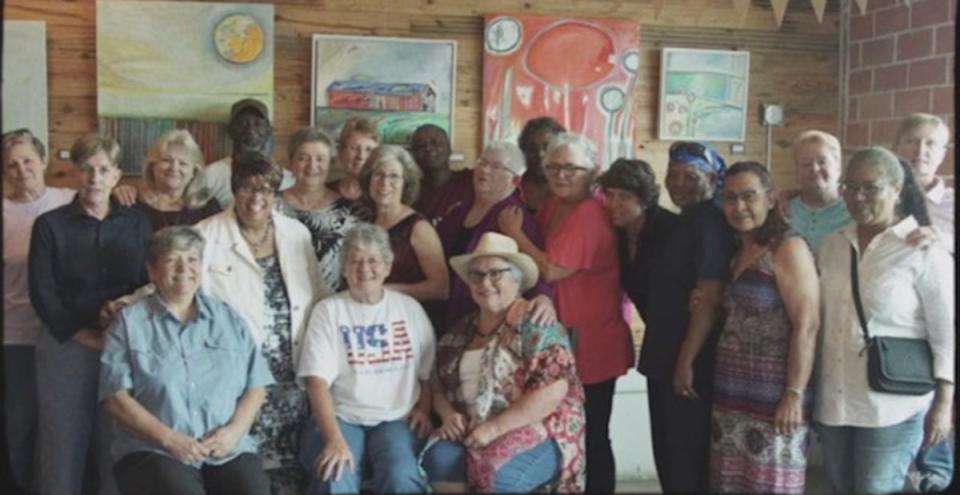
The women, however, continued to love the game and the opportunity to learn about each other. The film chronicles how there were some romantic relationships between teammates; some gay players in the film warmly describe how the community of the league provided them with a feeling of safety, security and acceptance that was hard to find in the 1970s, particularly in Houston; vice squads were still known for lifestyle crackdowns.
Robin Massey, the team manager and coach’s wife, credits the Herricanes with broadening the social horizons of her pastor husband and the rest of the team. The women all came to accept and respect each other, regardless of orientation, race, social status or background.
“That was part of the draw for me,” Ms Haszlakiewicz tells The Independent, admitting that she came to the team from a mostly white community of privilege and higher education. “And I get thrown into this mass of writhing women of different colours, cultures and professions, and it was like, this is fantastic. This is amazing. I was definitely drawn by that.”
She continues: “It truly was kind of an art form in itself, how all of these different people came together to play this sport and to form a team. And you hear this from soldiers, how they form teams and they watch each other and take care of each other, and football... I don’t want to call it militaristic, but yeah, it kind of is. But it’s the same camaraderie and the same care that emerges or evolves. Somebody’s injured or is being attacked on your team, you’re gonna go and defend that person, and I don’t mean on the playing field, necessarily. You just form that same bond.”
After the Herricanes disbanded, the women lost touch — but Ms Kuan and her mother set about tracking down as many former players as they could once the filmmaker decided to make a documentary about the team. It was a decision she came to after realising that, unlike in her family, there was not a widespread knowledge that a full-tackle women’s football league had ever existed.
“It wasn’t until I started getting older that it became revealed to me that not everybody’s mom played football — and it was actually a very extraordinary thing that this happened,” she tells The Independent. “And whenever I talked about it to other people, they would react with either disbelief or trying to minimise it in some way, saying ‘Oh, it must have been like flag football or soccer or something.’
“And so eventually I got to the point where I realised that these women were getting older and with their history having not been told, ever ... and that’s what triggered the whole thing.”
They tracked down many of the Herricanes for not only interviews but also a 2019 reunion in Houston.
“One of the things that was clear, through talking to all of them, was that, even though they hadn’t seen each other in so long, they still felt a very strong connection to each other — one you can only really find when you play on a team like that, where you’re fully committed and in the trenches every day,” Ms Kuan says. “And when they all got together at the reunion, even though 40 years had passed, it was almost like not a day passed.”
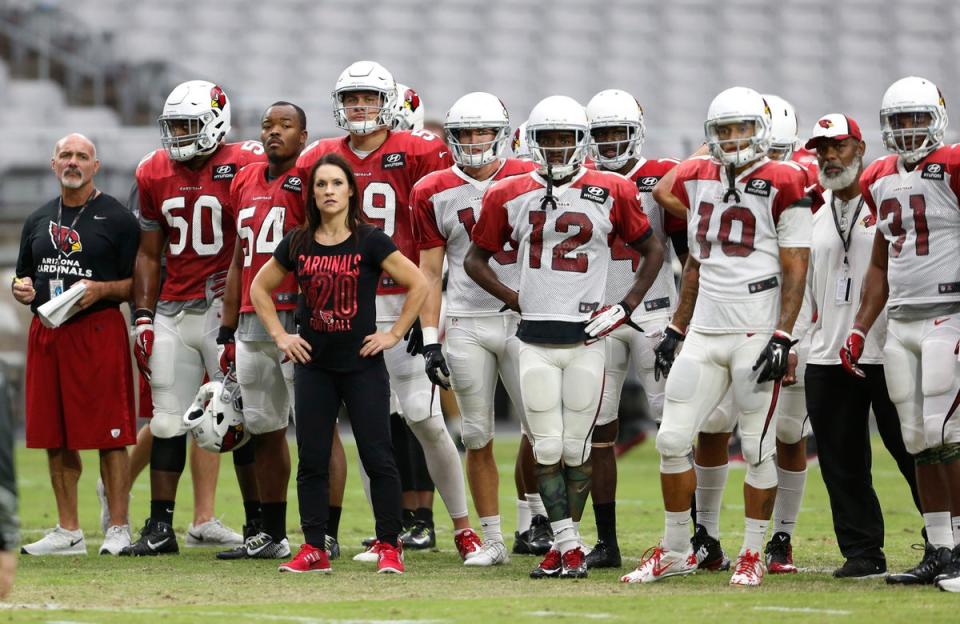
In addition to reminiscing and updating each other on the intervening four decades, the women also reflected on how women’s sports, and football, have progressed. The film charts developments since the Herricanes played, interviewing pioneers such as Jenn Welter, the first female coaching intern in the NFL who has two world championship gold medals, and Colette Smith, the first Black woman to coach in the NFL and first woman to coach the New York Jets.
They’re encouraged by the strides women have made within the sport — but it’s universally acknowledged that there is far more progress to be made.
“Football was the first place that somebody told me, ‘You can’t do that’ because I was a girl,” Ms Welter says in the film. “It wasn’t even a discussion [of] ‘if you work hard,’ or ‘if you do this;’ it was just a hard no. And football was that line in the sand. I mean, they call it the final frontier for women in sports for a reason.”
She says there needs to be a battle against the misconception that women don’t want to play football.
“They’ve never been given the opportunity to see if they want to play football,” she says in the film. “Whether or not they do, that’s a choice. Not every boy wants to play football, either. But if you haven’t gotten the opportunity to ... experience the joy of catching a pass or, you know, spiking the ball in the endzone and doing an endzone dance, then how would you fall in love with the game in the same way and to the same extent as the boys would?”
Whether it’s football or another passion, Ms Kuan hopes The Herricanes inspires young people to broaden their horizons — in addition to cementing the Houston women’s history on film and bringing their story to a wider audience.
“I want people to think about something that they havne’t thought about before and just allow it to expand the realm of possibility for whatever level of prejudice we’re at, because we all have some level of prejudice — it’s a spectrum, it’s not black and white — and to challenge their own ideas of what is possible and who can do what,” she tells The Independent.
“I’m not saying that everybody needs to go out and play football, but maybe there’s an idea of being able to do something that you hadn’t thought about before. And that’s all that, really, I want to get across.”

